Prison and Mental Health Reform
VerifiedAdded on 2023/05/30
|13
|3615
|259
AI Summary
This article discusses the impact of mental illness on the criminal justice system and the measures that can be taken to provide therapeutic and clinical care to individuals with mental illness in prisons. It also explores the effects of drug use on deviant behavior and mental health. Additionally, it provides insights into the legislative and procedural background to the practical application of mental health law by the police.
Contribute Materials
Your contribution can guide someone’s learning journey. Share your
documents today.
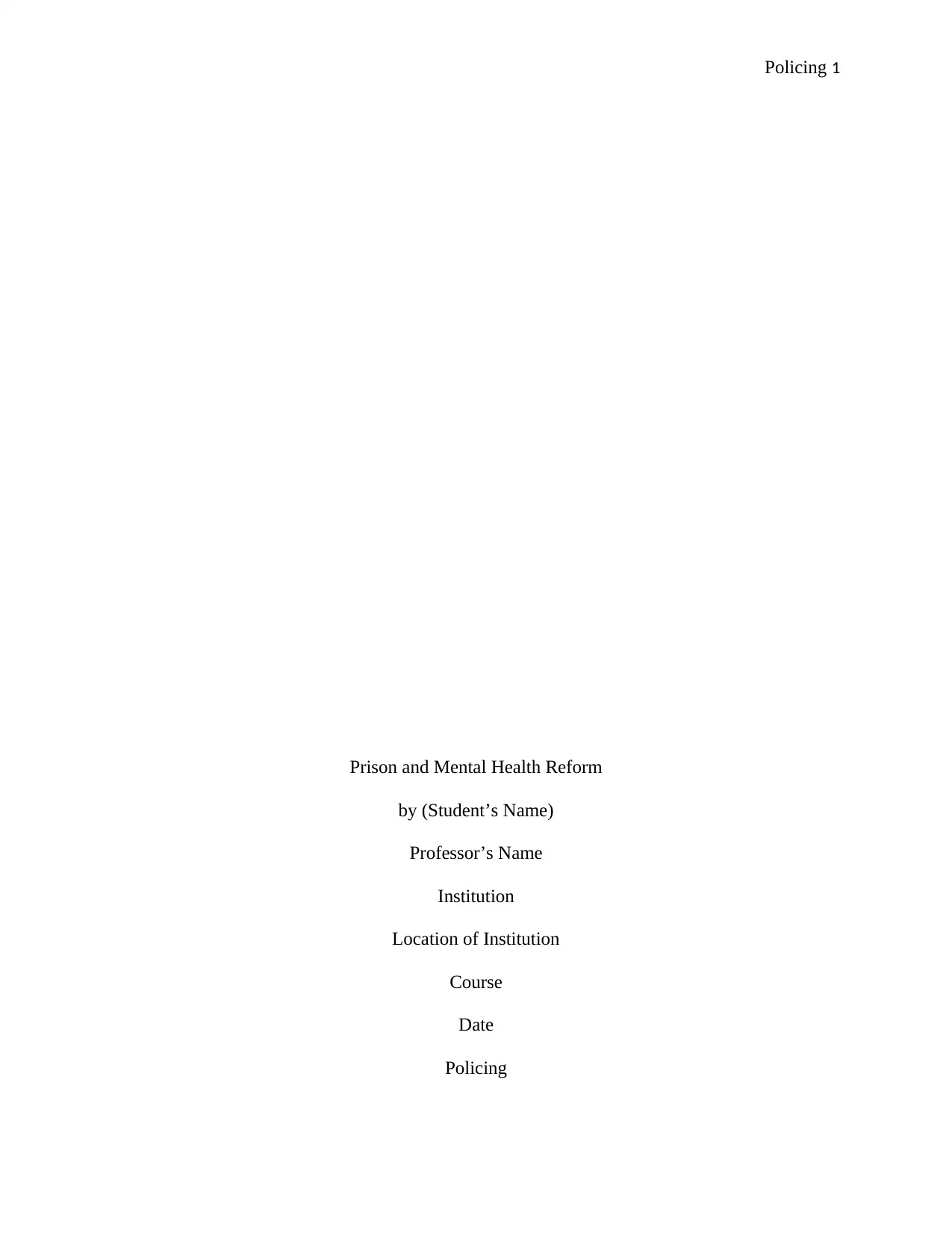
Policing 1
Prison and Mental Health Reform
by (Student’s Name)
Professor’s Name
Institution
Location of Institution
Course
Date
Policing
Prison and Mental Health Reform
by (Student’s Name)
Professor’s Name
Institution
Location of Institution
Course
Date
Policing
Secure Best Marks with AI Grader
Need help grading? Try our AI Grader for instant feedback on your assignments.
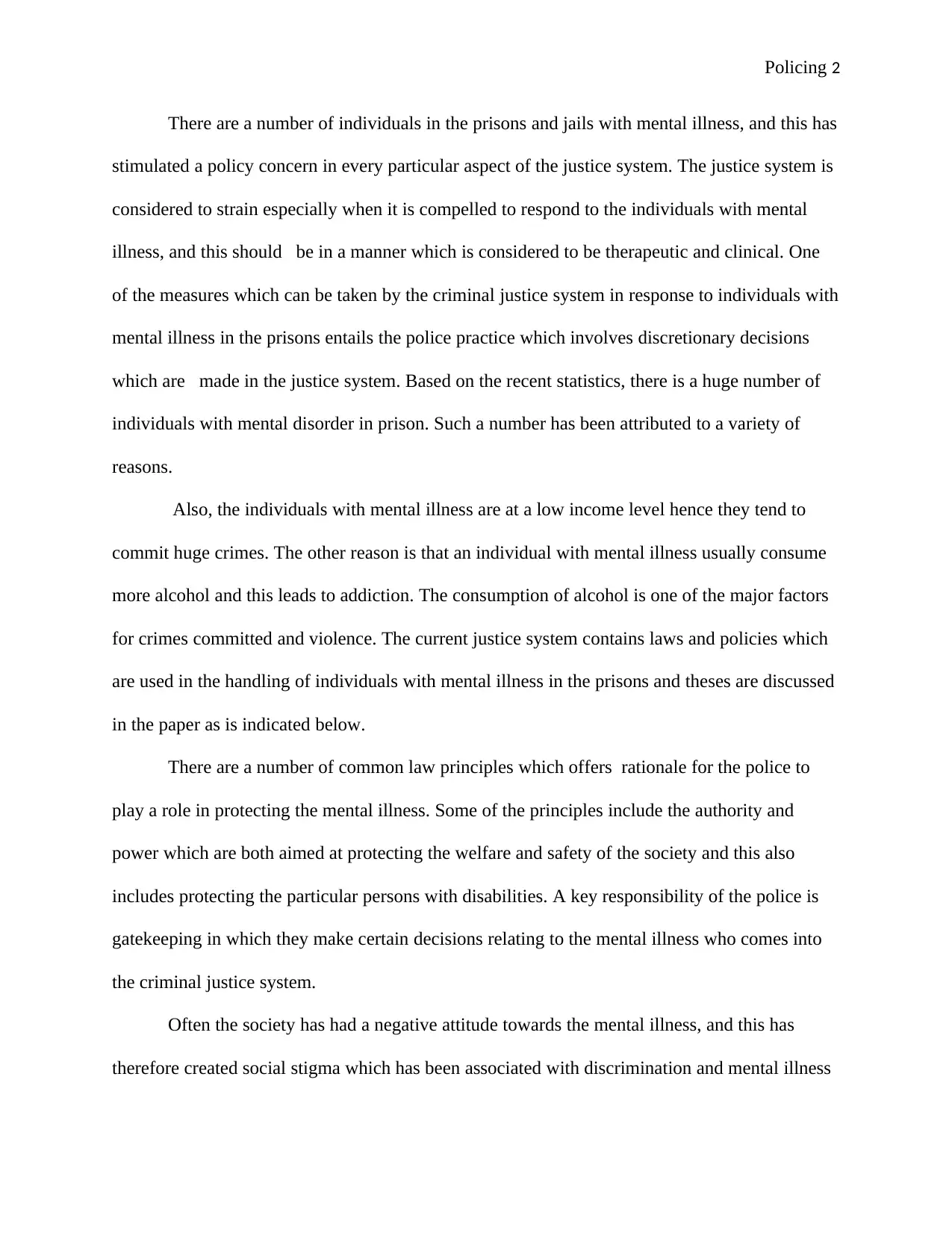
Policing 2
There are a number of individuals in the prisons and jails with mental illness, and this has
stimulated a policy concern in every particular aspect of the justice system. The justice system is
considered to strain especially when it is compelled to respond to the individuals with mental
illness, and this should be in a manner which is considered to be therapeutic and clinical. One
of the measures which can be taken by the criminal justice system in response to individuals with
mental illness in the prisons entails the police practice which involves discretionary decisions
which are made in the justice system. Based on the recent statistics, there is a huge number of
individuals with mental disorder in prison. Such a number has been attributed to a variety of
reasons.
Also, the individuals with mental illness are at a low income level hence they tend to
commit huge crimes. The other reason is that an individual with mental illness usually consume
more alcohol and this leads to addiction. The consumption of alcohol is one of the major factors
for crimes committed and violence. The current justice system contains laws and policies which
are used in the handling of individuals with mental illness in the prisons and theses are discussed
in the paper as is indicated below.
There are a number of common law principles which offers rationale for the police to
play a role in protecting the mental illness. Some of the principles include the authority and
power which are both aimed at protecting the welfare and safety of the society and this also
includes protecting the particular persons with disabilities. A key responsibility of the police is
gatekeeping in which they make certain decisions relating to the mental illness who comes into
the criminal justice system.
Often the society has had a negative attitude towards the mental illness, and this has
therefore created social stigma which has been associated with discrimination and mental illness
There are a number of individuals in the prisons and jails with mental illness, and this has
stimulated a policy concern in every particular aspect of the justice system. The justice system is
considered to strain especially when it is compelled to respond to the individuals with mental
illness, and this should be in a manner which is considered to be therapeutic and clinical. One
of the measures which can be taken by the criminal justice system in response to individuals with
mental illness in the prisons entails the police practice which involves discretionary decisions
which are made in the justice system. Based on the recent statistics, there is a huge number of
individuals with mental disorder in prison. Such a number has been attributed to a variety of
reasons.
Also, the individuals with mental illness are at a low income level hence they tend to
commit huge crimes. The other reason is that an individual with mental illness usually consume
more alcohol and this leads to addiction. The consumption of alcohol is one of the major factors
for crimes committed and violence. The current justice system contains laws and policies which
are used in the handling of individuals with mental illness in the prisons and theses are discussed
in the paper as is indicated below.
There are a number of common law principles which offers rationale for the police to
play a role in protecting the mental illness. Some of the principles include the authority and
power which are both aimed at protecting the welfare and safety of the society and this also
includes protecting the particular persons with disabilities. A key responsibility of the police is
gatekeeping in which they make certain decisions relating to the mental illness who comes into
the criminal justice system.
Often the society has had a negative attitude towards the mental illness, and this has
therefore created social stigma which has been associated with discrimination and mental illness
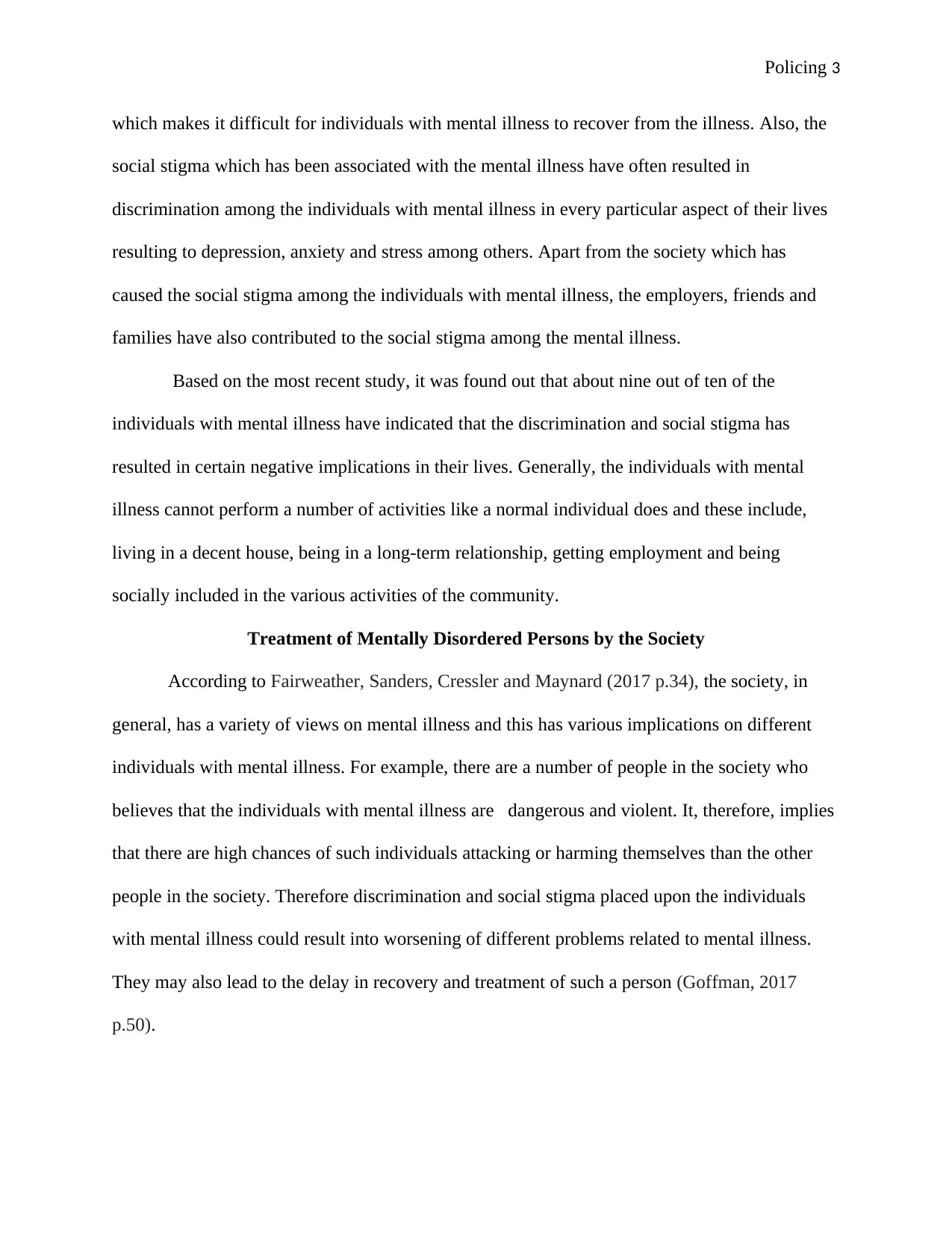
Policing 3
which makes it difficult for individuals with mental illness to recover from the illness. Also, the
social stigma which has been associated with the mental illness have often resulted in
discrimination among the individuals with mental illness in every particular aspect of their lives
resulting to depression, anxiety and stress among others. Apart from the society which has
caused the social stigma among the individuals with mental illness, the employers, friends and
families have also contributed to the social stigma among the mental illness.
Based on the most recent study, it was found out that about nine out of ten of the
individuals with mental illness have indicated that the discrimination and social stigma has
resulted in certain negative implications in their lives. Generally, the individuals with mental
illness cannot perform a number of activities like a normal individual does and these include,
living in a decent house, being in a long-term relationship, getting employment and being
socially included in the various activities of the community.
Treatment of Mentally Disordered Persons by the Society
According to Fairweather, Sanders, Cressler and Maynard (2017 p.34), the society, in
general, has a variety of views on mental illness and this has various implications on different
individuals with mental illness. For example, there are a number of people in the society who
believes that the individuals with mental illness are dangerous and violent. It, therefore, implies
that there are high chances of such individuals attacking or harming themselves than the other
people in the society. Therefore discrimination and social stigma placed upon the individuals
with mental illness could result into worsening of different problems related to mental illness.
They may also lead to the delay in recovery and treatment of such a person (Goffman, 2017
p.50).
which makes it difficult for individuals with mental illness to recover from the illness. Also, the
social stigma which has been associated with the mental illness have often resulted in
discrimination among the individuals with mental illness in every particular aspect of their lives
resulting to depression, anxiety and stress among others. Apart from the society which has
caused the social stigma among the individuals with mental illness, the employers, friends and
families have also contributed to the social stigma among the mental illness.
Based on the most recent study, it was found out that about nine out of ten of the
individuals with mental illness have indicated that the discrimination and social stigma has
resulted in certain negative implications in their lives. Generally, the individuals with mental
illness cannot perform a number of activities like a normal individual does and these include,
living in a decent house, being in a long-term relationship, getting employment and being
socially included in the various activities of the community.
Treatment of Mentally Disordered Persons by the Society
According to Fairweather, Sanders, Cressler and Maynard (2017 p.34), the society, in
general, has a variety of views on mental illness and this has various implications on different
individuals with mental illness. For example, there are a number of people in the society who
believes that the individuals with mental illness are dangerous and violent. It, therefore, implies
that there are high chances of such individuals attacking or harming themselves than the other
people in the society. Therefore discrimination and social stigma placed upon the individuals
with mental illness could result into worsening of different problems related to mental illness.
They may also lead to the delay in recovery and treatment of such a person (Goffman, 2017
p.50).
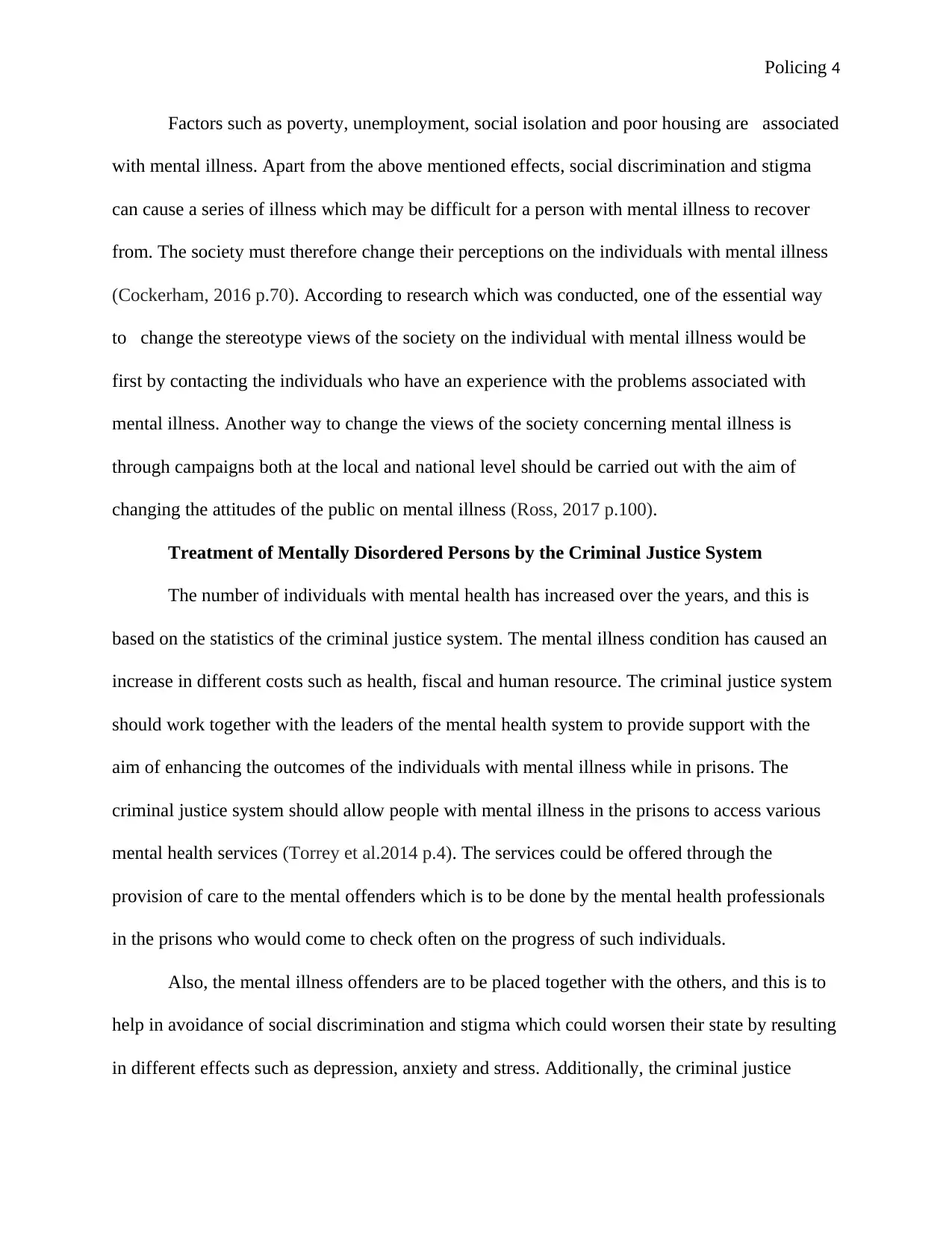
Policing 4
Factors such as poverty, unemployment, social isolation and poor housing are associated
with mental illness. Apart from the above mentioned effects, social discrimination and stigma
can cause a series of illness which may be difficult for a person with mental illness to recover
from. The society must therefore change their perceptions on the individuals with mental illness
(Cockerham, 2016 p.70). According to research which was conducted, one of the essential way
to change the stereotype views of the society on the individual with mental illness would be
first by contacting the individuals who have an experience with the problems associated with
mental illness. Another way to change the views of the society concerning mental illness is
through campaigns both at the local and national level should be carried out with the aim of
changing the attitudes of the public on mental illness (Ross, 2017 p.100).
Treatment of Mentally Disordered Persons by the Criminal Justice System
The number of individuals with mental health has increased over the years, and this is
based on the statistics of the criminal justice system. The mental illness condition has caused an
increase in different costs such as health, fiscal and human resource. The criminal justice system
should work together with the leaders of the mental health system to provide support with the
aim of enhancing the outcomes of the individuals with mental illness while in prisons. The
criminal justice system should allow people with mental illness in the prisons to access various
mental health services (Torrey et al.2014 p.4). The services could be offered through the
provision of care to the mental offenders which is to be done by the mental health professionals
in the prisons who would come to check often on the progress of such individuals.
Also, the mental illness offenders are to be placed together with the others, and this is to
help in avoidance of social discrimination and stigma which could worsen their state by resulting
in different effects such as depression, anxiety and stress. Additionally, the criminal justice
Factors such as poverty, unemployment, social isolation and poor housing are associated
with mental illness. Apart from the above mentioned effects, social discrimination and stigma
can cause a series of illness which may be difficult for a person with mental illness to recover
from. The society must therefore change their perceptions on the individuals with mental illness
(Cockerham, 2016 p.70). According to research which was conducted, one of the essential way
to change the stereotype views of the society on the individual with mental illness would be
first by contacting the individuals who have an experience with the problems associated with
mental illness. Another way to change the views of the society concerning mental illness is
through campaigns both at the local and national level should be carried out with the aim of
changing the attitudes of the public on mental illness (Ross, 2017 p.100).
Treatment of Mentally Disordered Persons by the Criminal Justice System
The number of individuals with mental health has increased over the years, and this is
based on the statistics of the criminal justice system. The mental illness condition has caused an
increase in different costs such as health, fiscal and human resource. The criminal justice system
should work together with the leaders of the mental health system to provide support with the
aim of enhancing the outcomes of the individuals with mental illness while in prisons. The
criminal justice system should allow people with mental illness in the prisons to access various
mental health services (Torrey et al.2014 p.4). The services could be offered through the
provision of care to the mental offenders which is to be done by the mental health professionals
in the prisons who would come to check often on the progress of such individuals.
Also, the mental illness offenders are to be placed together with the others, and this is to
help in avoidance of social discrimination and stigma which could worsen their state by resulting
in different effects such as depression, anxiety and stress. Additionally, the criminal justice
Secure Best Marks with AI Grader
Need help grading? Try our AI Grader for instant feedback on your assignments.
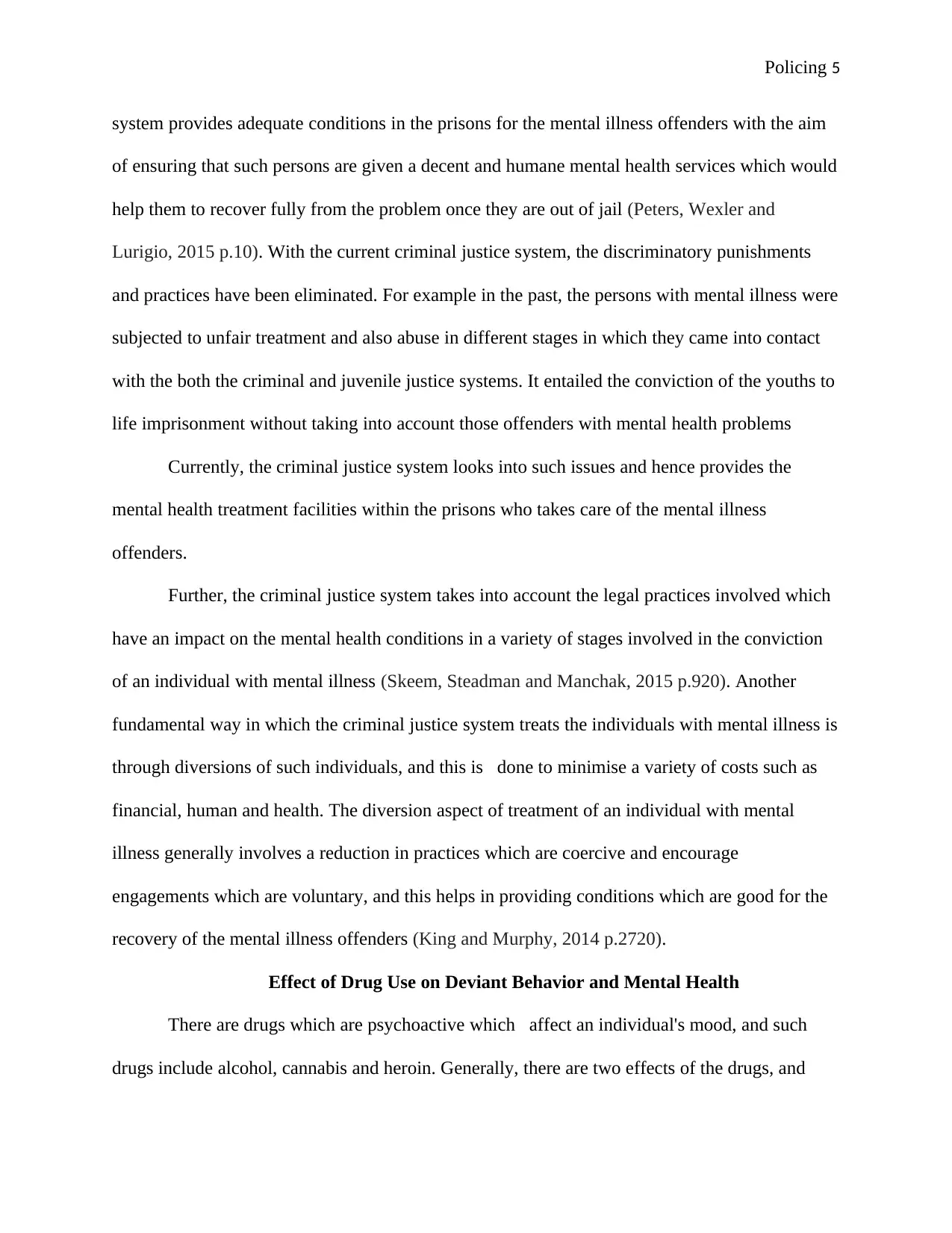
Policing 5
system provides adequate conditions in the prisons for the mental illness offenders with the aim
of ensuring that such persons are given a decent and humane mental health services which would
help them to recover fully from the problem once they are out of jail (Peters, Wexler and
Lurigio, 2015 p.10). With the current criminal justice system, the discriminatory punishments
and practices have been eliminated. For example in the past, the persons with mental illness were
subjected to unfair treatment and also abuse in different stages in which they came into contact
with the both the criminal and juvenile justice systems. It entailed the conviction of the youths to
life imprisonment without taking into account those offenders with mental health problems
Currently, the criminal justice system looks into such issues and hence provides the
mental health treatment facilities within the prisons who takes care of the mental illness
offenders.
Further, the criminal justice system takes into account the legal practices involved which
have an impact on the mental health conditions in a variety of stages involved in the conviction
of an individual with mental illness (Skeem, Steadman and Manchak, 2015 p.920). Another
fundamental way in which the criminal justice system treats the individuals with mental illness is
through diversions of such individuals, and this is done to minimise a variety of costs such as
financial, human and health. The diversion aspect of treatment of an individual with mental
illness generally involves a reduction in practices which are coercive and encourage
engagements which are voluntary, and this helps in providing conditions which are good for the
recovery of the mental illness offenders (King and Murphy, 2014 p.2720).
Effect of Drug Use on Deviant Behavior and Mental Health
There are drugs which are psychoactive which affect an individual's mood, and such
drugs include alcohol, cannabis and heroin. Generally, there are two effects of the drugs, and
system provides adequate conditions in the prisons for the mental illness offenders with the aim
of ensuring that such persons are given a decent and humane mental health services which would
help them to recover fully from the problem once they are out of jail (Peters, Wexler and
Lurigio, 2015 p.10). With the current criminal justice system, the discriminatory punishments
and practices have been eliminated. For example in the past, the persons with mental illness were
subjected to unfair treatment and also abuse in different stages in which they came into contact
with the both the criminal and juvenile justice systems. It entailed the conviction of the youths to
life imprisonment without taking into account those offenders with mental health problems
Currently, the criminal justice system looks into such issues and hence provides the
mental health treatment facilities within the prisons who takes care of the mental illness
offenders.
Further, the criminal justice system takes into account the legal practices involved which
have an impact on the mental health conditions in a variety of stages involved in the conviction
of an individual with mental illness (Skeem, Steadman and Manchak, 2015 p.920). Another
fundamental way in which the criminal justice system treats the individuals with mental illness is
through diversions of such individuals, and this is done to minimise a variety of costs such as
financial, human and health. The diversion aspect of treatment of an individual with mental
illness generally involves a reduction in practices which are coercive and encourage
engagements which are voluntary, and this helps in providing conditions which are good for the
recovery of the mental illness offenders (King and Murphy, 2014 p.2720).
Effect of Drug Use on Deviant Behavior and Mental Health
There are drugs which are psychoactive which affect an individual's mood, and such
drugs include alcohol, cannabis and heroin. Generally, there are two effects of the drugs, and
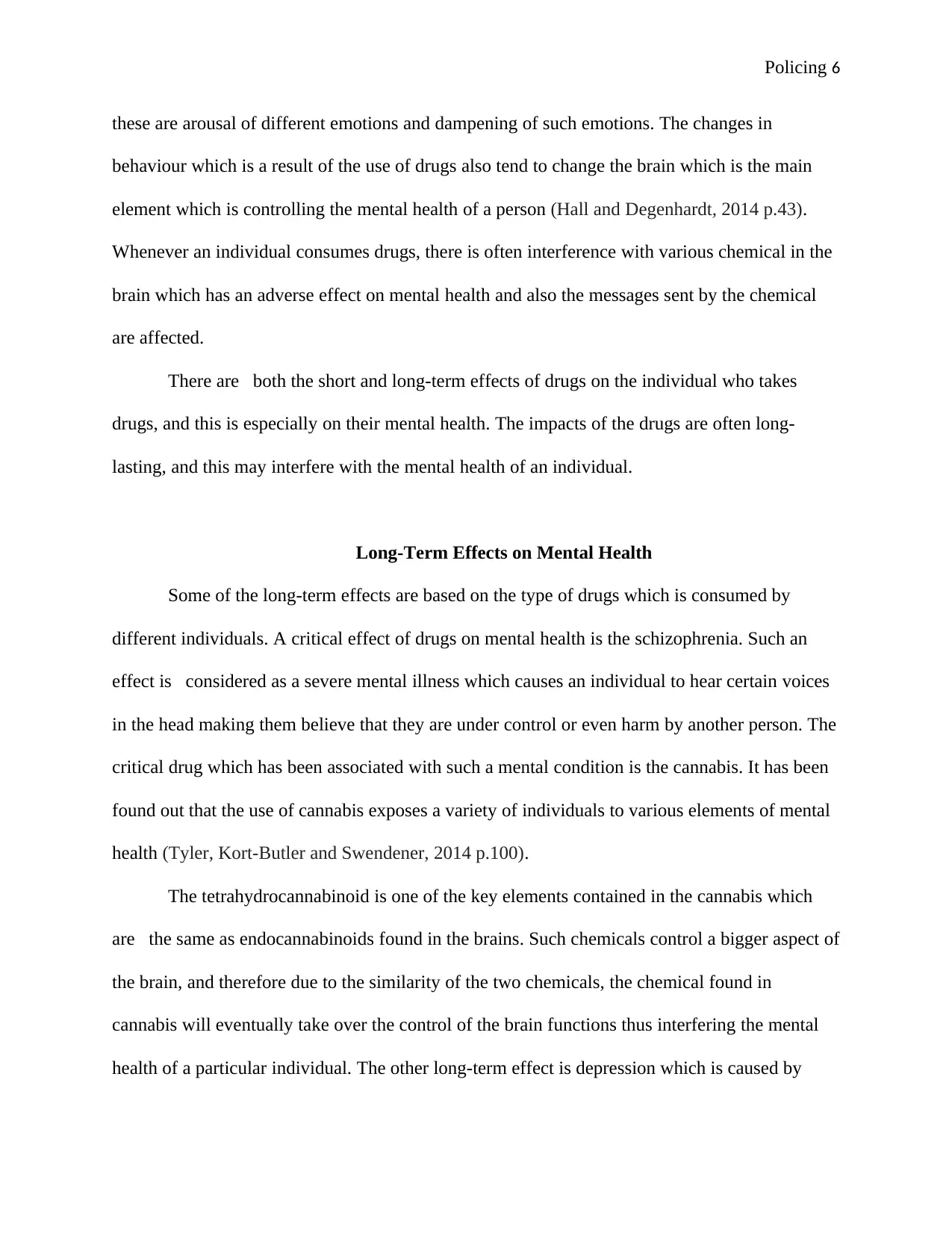
Policing 6
these are arousal of different emotions and dampening of such emotions. The changes in
behaviour which is a result of the use of drugs also tend to change the brain which is the main
element which is controlling the mental health of a person (Hall and Degenhardt, 2014 p.43).
Whenever an individual consumes drugs, there is often interference with various chemical in the
brain which has an adverse effect on mental health and also the messages sent by the chemical
are affected.
There are both the short and long-term effects of drugs on the individual who takes
drugs, and this is especially on their mental health. The impacts of the drugs are often long-
lasting, and this may interfere with the mental health of an individual.
Long-Term Effects on Mental Health
Some of the long-term effects are based on the type of drugs which is consumed by
different individuals. A critical effect of drugs on mental health is the schizophrenia. Such an
effect is considered as a severe mental illness which causes an individual to hear certain voices
in the head making them believe that they are under control or even harm by another person. The
critical drug which has been associated with such a mental condition is the cannabis. It has been
found out that the use of cannabis exposes a variety of individuals to various elements of mental
health (Tyler, Kort-Butler and Swendener, 2014 p.100).
The tetrahydrocannabinoid is one of the key elements contained in the cannabis which
are the same as endocannabinoids found in the brains. Such chemicals control a bigger aspect of
the brain, and therefore due to the similarity of the two chemicals, the chemical found in
cannabis will eventually take over the control of the brain functions thus interfering the mental
health of a particular individual. The other long-term effect is depression which is caused by
these are arousal of different emotions and dampening of such emotions. The changes in
behaviour which is a result of the use of drugs also tend to change the brain which is the main
element which is controlling the mental health of a person (Hall and Degenhardt, 2014 p.43).
Whenever an individual consumes drugs, there is often interference with various chemical in the
brain which has an adverse effect on mental health and also the messages sent by the chemical
are affected.
There are both the short and long-term effects of drugs on the individual who takes
drugs, and this is especially on their mental health. The impacts of the drugs are often long-
lasting, and this may interfere with the mental health of an individual.
Long-Term Effects on Mental Health
Some of the long-term effects are based on the type of drugs which is consumed by
different individuals. A critical effect of drugs on mental health is the schizophrenia. Such an
effect is considered as a severe mental illness which causes an individual to hear certain voices
in the head making them believe that they are under control or even harm by another person. The
critical drug which has been associated with such a mental condition is the cannabis. It has been
found out that the use of cannabis exposes a variety of individuals to various elements of mental
health (Tyler, Kort-Butler and Swendener, 2014 p.100).
The tetrahydrocannabinoid is one of the key elements contained in the cannabis which
are the same as endocannabinoids found in the brains. Such chemicals control a bigger aspect of
the brain, and therefore due to the similarity of the two chemicals, the chemical found in
cannabis will eventually take over the control of the brain functions thus interfering the mental
health of a particular individual. The other long-term effect is depression which is caused by
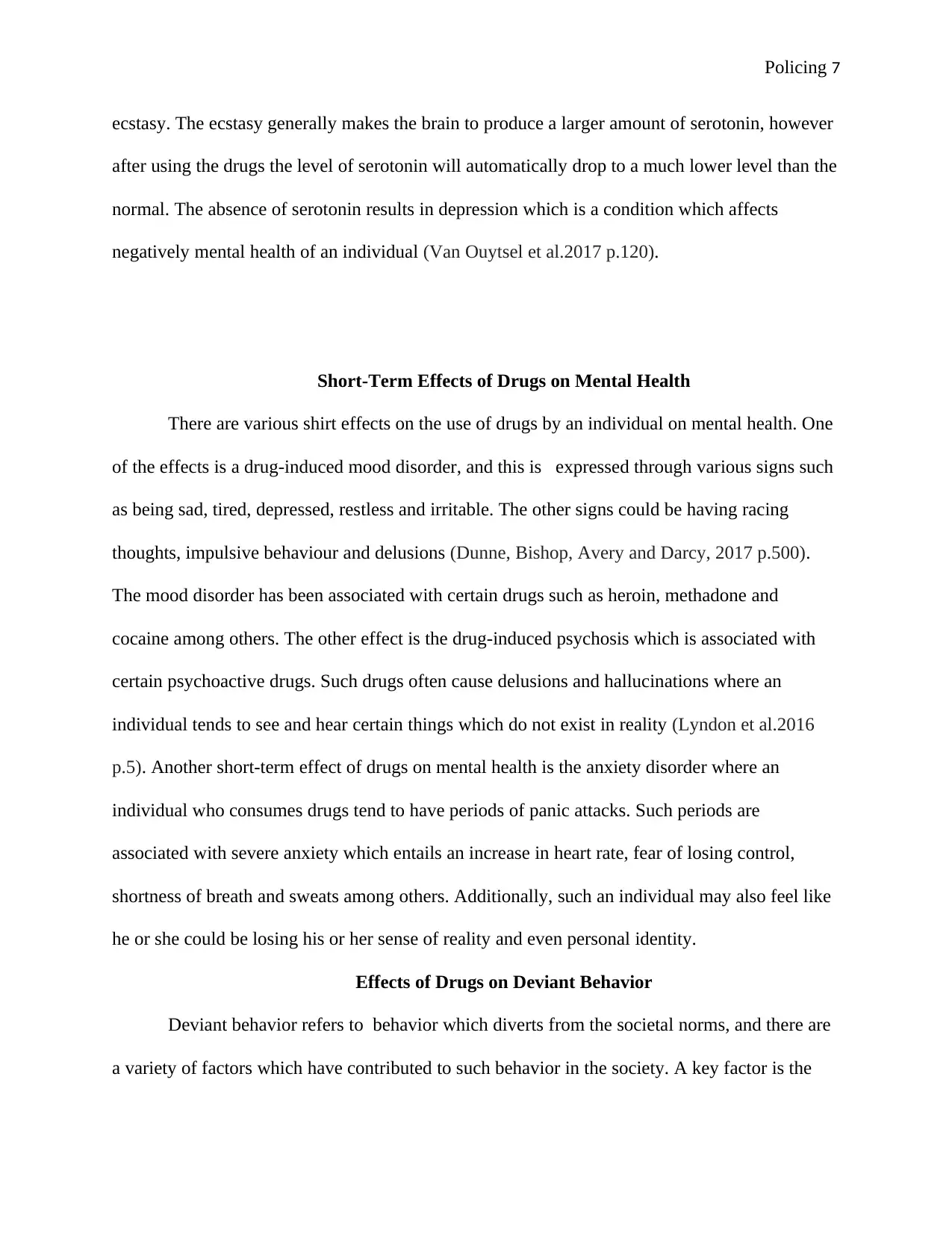
Policing 7
ecstasy. The ecstasy generally makes the brain to produce a larger amount of serotonin, however
after using the drugs the level of serotonin will automatically drop to a much lower level than the
normal. The absence of serotonin results in depression which is a condition which affects
negatively mental health of an individual (Van Ouytsel et al.2017 p.120).
Short-Term Effects of Drugs on Mental Health
There are various shirt effects on the use of drugs by an individual on mental health. One
of the effects is a drug-induced mood disorder, and this is expressed through various signs such
as being sad, tired, depressed, restless and irritable. The other signs could be having racing
thoughts, impulsive behaviour and delusions (Dunne, Bishop, Avery and Darcy, 2017 p.500).
The mood disorder has been associated with certain drugs such as heroin, methadone and
cocaine among others. The other effect is the drug-induced psychosis which is associated with
certain psychoactive drugs. Such drugs often cause delusions and hallucinations where an
individual tends to see and hear certain things which do not exist in reality (Lyndon et al.2016
p.5). Another short-term effect of drugs on mental health is the anxiety disorder where an
individual who consumes drugs tend to have periods of panic attacks. Such periods are
associated with severe anxiety which entails an increase in heart rate, fear of losing control,
shortness of breath and sweats among others. Additionally, such an individual may also feel like
he or she could be losing his or her sense of reality and even personal identity.
Effects of Drugs on Deviant Behavior
Deviant behavior refers to behavior which diverts from the societal norms, and there are
a variety of factors which have contributed to such behavior in the society. A key factor is the
ecstasy. The ecstasy generally makes the brain to produce a larger amount of serotonin, however
after using the drugs the level of serotonin will automatically drop to a much lower level than the
normal. The absence of serotonin results in depression which is a condition which affects
negatively mental health of an individual (Van Ouytsel et al.2017 p.120).
Short-Term Effects of Drugs on Mental Health
There are various shirt effects on the use of drugs by an individual on mental health. One
of the effects is a drug-induced mood disorder, and this is expressed through various signs such
as being sad, tired, depressed, restless and irritable. The other signs could be having racing
thoughts, impulsive behaviour and delusions (Dunne, Bishop, Avery and Darcy, 2017 p.500).
The mood disorder has been associated with certain drugs such as heroin, methadone and
cocaine among others. The other effect is the drug-induced psychosis which is associated with
certain psychoactive drugs. Such drugs often cause delusions and hallucinations where an
individual tends to see and hear certain things which do not exist in reality (Lyndon et al.2016
p.5). Another short-term effect of drugs on mental health is the anxiety disorder where an
individual who consumes drugs tend to have periods of panic attacks. Such periods are
associated with severe anxiety which entails an increase in heart rate, fear of losing control,
shortness of breath and sweats among others. Additionally, such an individual may also feel like
he or she could be losing his or her sense of reality and even personal identity.
Effects of Drugs on Deviant Behavior
Deviant behavior refers to behavior which diverts from the societal norms, and there are
a variety of factors which have contributed to such behavior in the society. A key factor is the
Paraphrase This Document
Need a fresh take? Get an instant paraphrase of this document with our AI Paraphraser
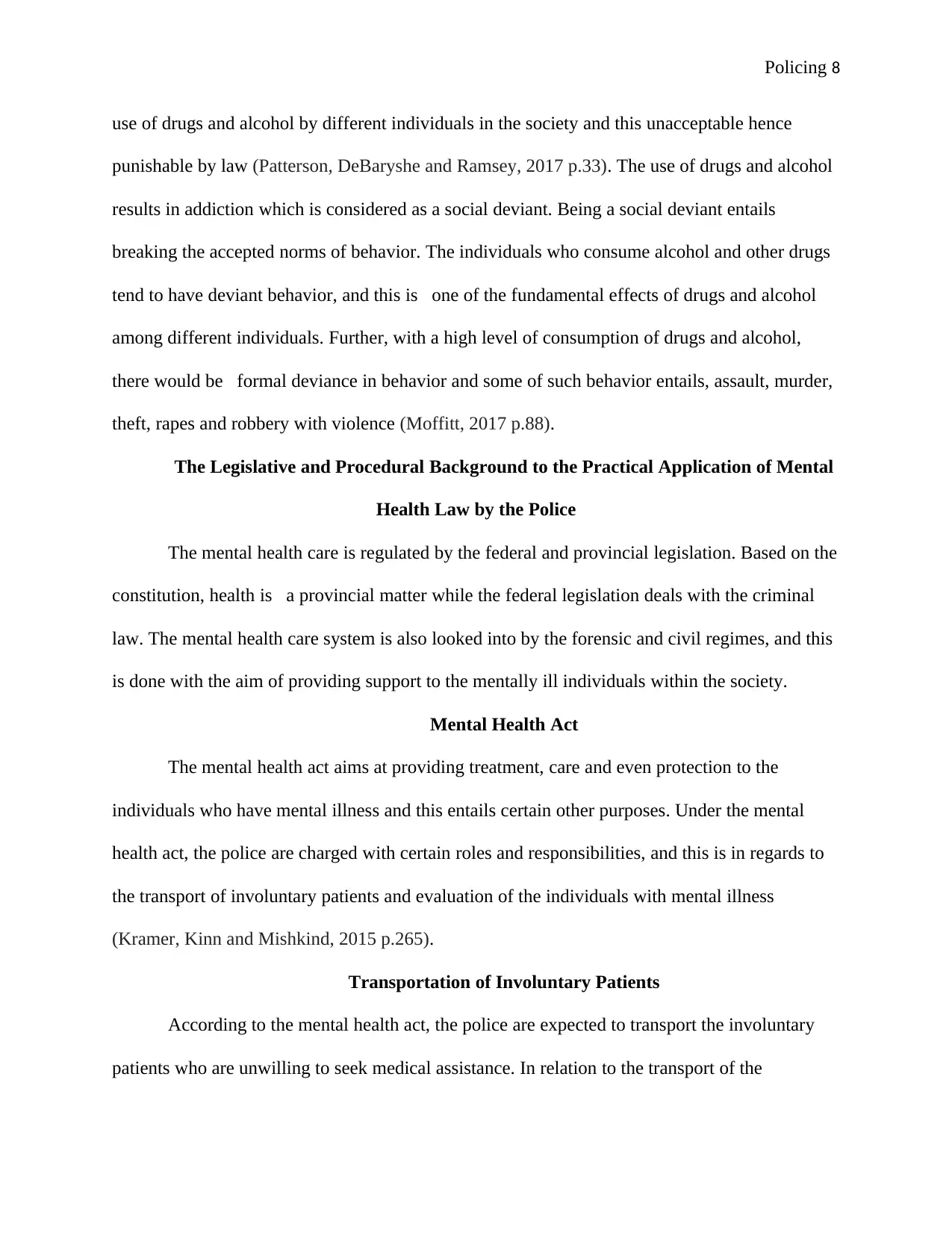
Policing 8
use of drugs and alcohol by different individuals in the society and this unacceptable hence
punishable by law (Patterson, DeBaryshe and Ramsey, 2017 p.33). The use of drugs and alcohol
results in addiction which is considered as a social deviant. Being a social deviant entails
breaking the accepted norms of behavior. The individuals who consume alcohol and other drugs
tend to have deviant behavior, and this is one of the fundamental effects of drugs and alcohol
among different individuals. Further, with a high level of consumption of drugs and alcohol,
there would be formal deviance in behavior and some of such behavior entails, assault, murder,
theft, rapes and robbery with violence (Moffitt, 2017 p.88).
The Legislative and Procedural Background to the Practical Application of Mental
Health Law by the Police
The mental health care is regulated by the federal and provincial legislation. Based on the
constitution, health is a provincial matter while the federal legislation deals with the criminal
law. The mental health care system is also looked into by the forensic and civil regimes, and this
is done with the aim of providing support to the mentally ill individuals within the society.
Mental Health Act
The mental health act aims at providing treatment, care and even protection to the
individuals who have mental illness and this entails certain other purposes. Under the mental
health act, the police are charged with certain roles and responsibilities, and this is in regards to
the transport of involuntary patients and evaluation of the individuals with mental illness
(Kramer, Kinn and Mishkind, 2015 p.265).
Transportation of Involuntary Patients
According to the mental health act, the police are expected to transport the involuntary
patients who are unwilling to seek medical assistance. In relation to the transport of the
use of drugs and alcohol by different individuals in the society and this unacceptable hence
punishable by law (Patterson, DeBaryshe and Ramsey, 2017 p.33). The use of drugs and alcohol
results in addiction which is considered as a social deviant. Being a social deviant entails
breaking the accepted norms of behavior. The individuals who consume alcohol and other drugs
tend to have deviant behavior, and this is one of the fundamental effects of drugs and alcohol
among different individuals. Further, with a high level of consumption of drugs and alcohol,
there would be formal deviance in behavior and some of such behavior entails, assault, murder,
theft, rapes and robbery with violence (Moffitt, 2017 p.88).
The Legislative and Procedural Background to the Practical Application of Mental
Health Law by the Police
The mental health care is regulated by the federal and provincial legislation. Based on the
constitution, health is a provincial matter while the federal legislation deals with the criminal
law. The mental health care system is also looked into by the forensic and civil regimes, and this
is done with the aim of providing support to the mentally ill individuals within the society.
Mental Health Act
The mental health act aims at providing treatment, care and even protection to the
individuals who have mental illness and this entails certain other purposes. Under the mental
health act, the police are charged with certain roles and responsibilities, and this is in regards to
the transport of involuntary patients and evaluation of the individuals with mental illness
(Kramer, Kinn and Mishkind, 2015 p.265).
Transportation of Involuntary Patients
According to the mental health act, the police are expected to transport the involuntary
patients who are unwilling to seek medical assistance. In relation to the transport of the
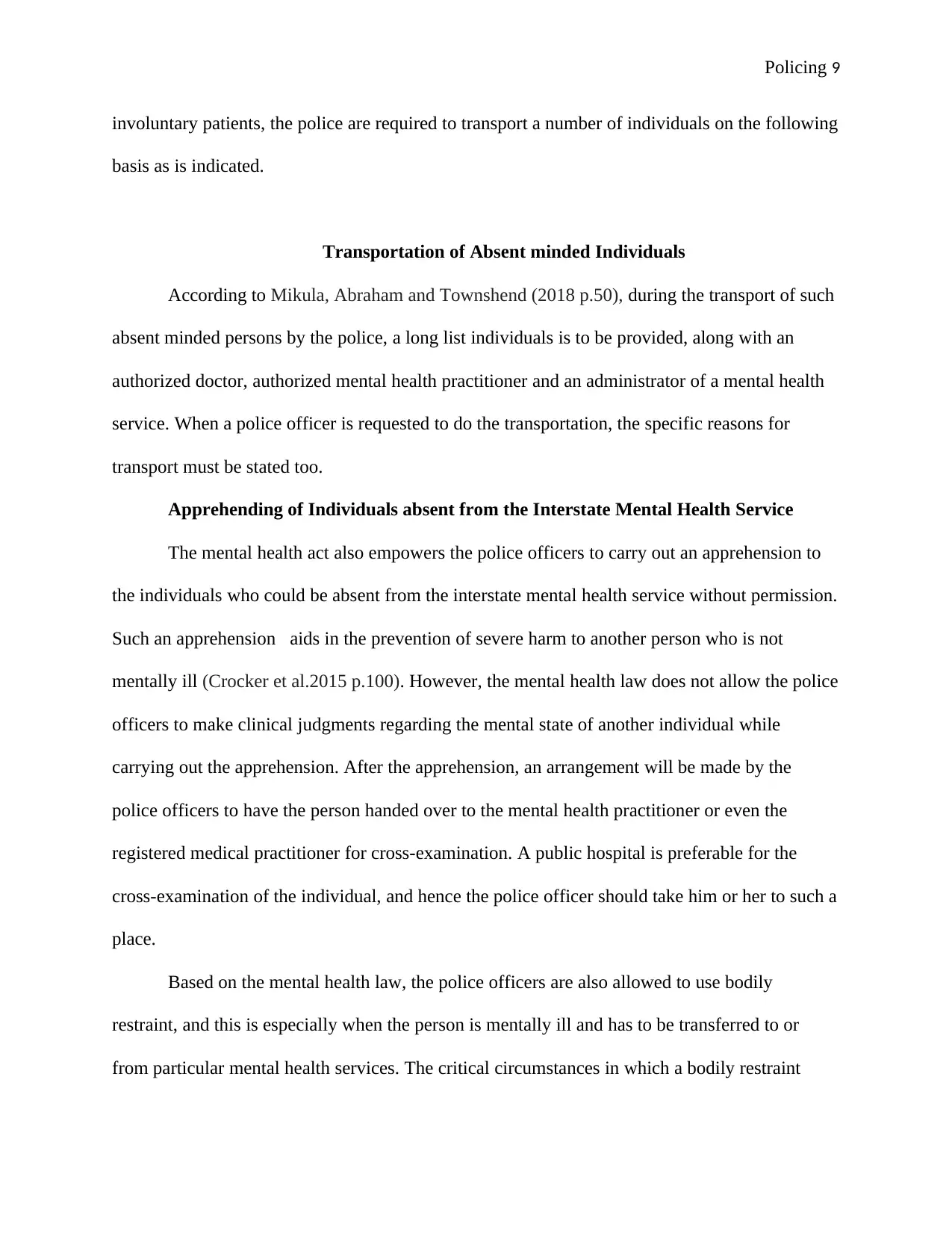
Policing 9
involuntary patients, the police are required to transport a number of individuals on the following
basis as is indicated.
Transportation of Absent minded Individuals
According to Mikula, Abraham and Townshend (2018 p.50), during the transport of such
absent minded persons by the police, a long list individuals is to be provided, along with an
authorized doctor, authorized mental health practitioner and an administrator of a mental health
service. When a police officer is requested to do the transportation, the specific reasons for
transport must be stated too.
Apprehending of Individuals absent from the Interstate Mental Health Service
The mental health act also empowers the police officers to carry out an apprehension to
the individuals who could be absent from the interstate mental health service without permission.
Such an apprehension aids in the prevention of severe harm to another person who is not
mentally ill (Crocker et al.2015 p.100). However, the mental health law does not allow the police
officers to make clinical judgments regarding the mental state of another individual while
carrying out the apprehension. After the apprehension, an arrangement will be made by the
police officers to have the person handed over to the mental health practitioner or even the
registered medical practitioner for cross-examination. A public hospital is preferable for the
cross-examination of the individual, and hence the police officer should take him or her to such a
place.
Based on the mental health law, the police officers are also allowed to use bodily
restraint, and this is especially when the person is mentally ill and has to be transferred to or
from particular mental health services. The critical circumstances in which a bodily restraint
involuntary patients, the police are required to transport a number of individuals on the following
basis as is indicated.
Transportation of Absent minded Individuals
According to Mikula, Abraham and Townshend (2018 p.50), during the transport of such
absent minded persons by the police, a long list individuals is to be provided, along with an
authorized doctor, authorized mental health practitioner and an administrator of a mental health
service. When a police officer is requested to do the transportation, the specific reasons for
transport must be stated too.
Apprehending of Individuals absent from the Interstate Mental Health Service
The mental health act also empowers the police officers to carry out an apprehension to
the individuals who could be absent from the interstate mental health service without permission.
Such an apprehension aids in the prevention of severe harm to another person who is not
mentally ill (Crocker et al.2015 p.100). However, the mental health law does not allow the police
officers to make clinical judgments regarding the mental state of another individual while
carrying out the apprehension. After the apprehension, an arrangement will be made by the
police officers to have the person handed over to the mental health practitioner or even the
registered medical practitioner for cross-examination. A public hospital is preferable for the
cross-examination of the individual, and hence the police officer should take him or her to such a
place.
Based on the mental health law, the police officers are also allowed to use bodily
restraint, and this is especially when the person is mentally ill and has to be transferred to or
from particular mental health services. The critical circumstances in which a bodily restraint
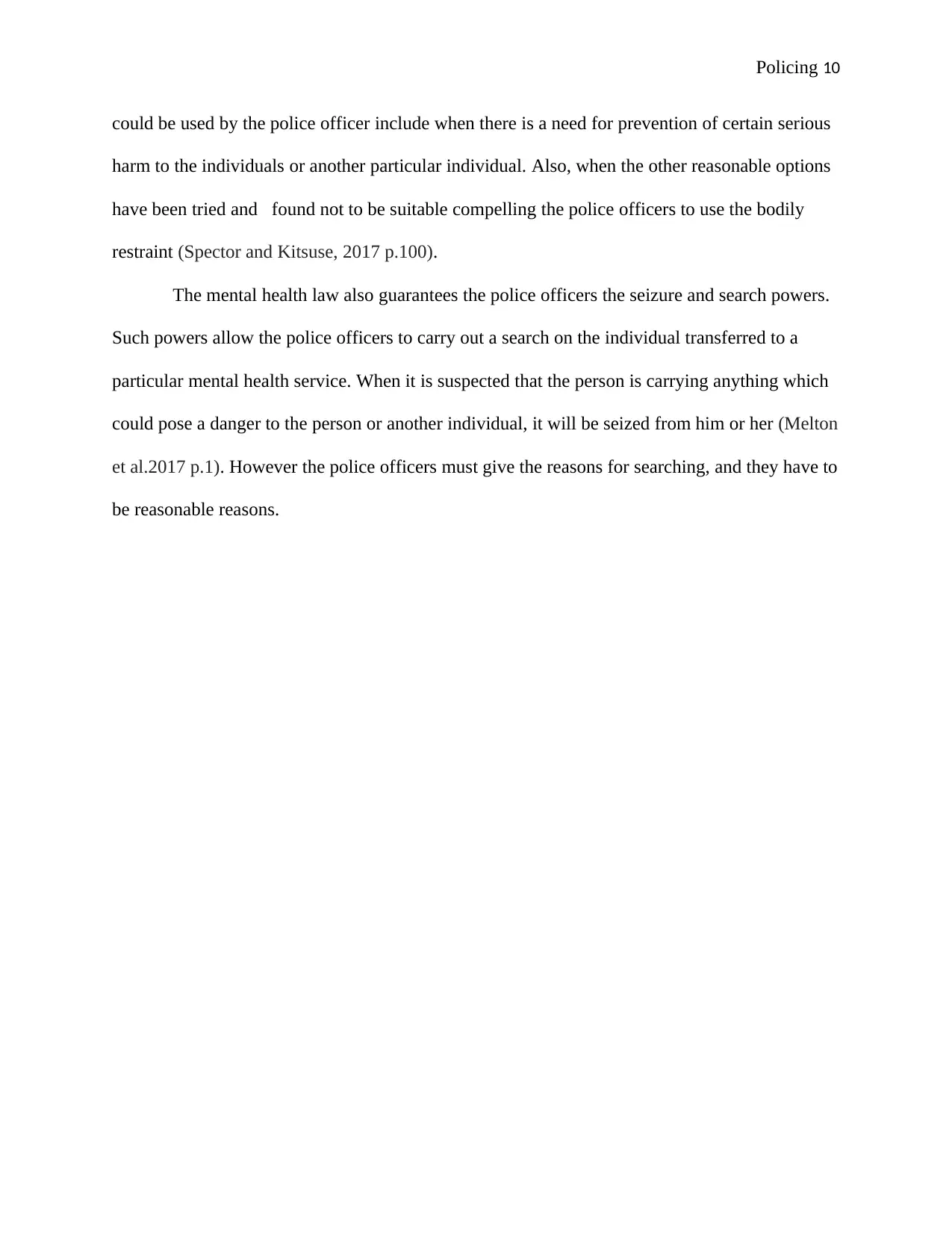
Policing 10
could be used by the police officer include when there is a need for prevention of certain serious
harm to the individuals or another particular individual. Also, when the other reasonable options
have been tried and found not to be suitable compelling the police officers to use the bodily
restraint (Spector and Kitsuse, 2017 p.100).
The mental health law also guarantees the police officers the seizure and search powers.
Such powers allow the police officers to carry out a search on the individual transferred to a
particular mental health service. When it is suspected that the person is carrying anything which
could pose a danger to the person or another individual, it will be seized from him or her (Melton
et al.2017 p.1). However the police officers must give the reasons for searching, and they have to
be reasonable reasons.
could be used by the police officer include when there is a need for prevention of certain serious
harm to the individuals or another particular individual. Also, when the other reasonable options
have been tried and found not to be suitable compelling the police officers to use the bodily
restraint (Spector and Kitsuse, 2017 p.100).
The mental health law also guarantees the police officers the seizure and search powers.
Such powers allow the police officers to carry out a search on the individual transferred to a
particular mental health service. When it is suspected that the person is carrying anything which
could pose a danger to the person or another individual, it will be seized from him or her (Melton
et al.2017 p.1). However the police officers must give the reasons for searching, and they have to
be reasonable reasons.
Secure Best Marks with AI Grader
Need help grading? Try our AI Grader for instant feedback on your assignments.
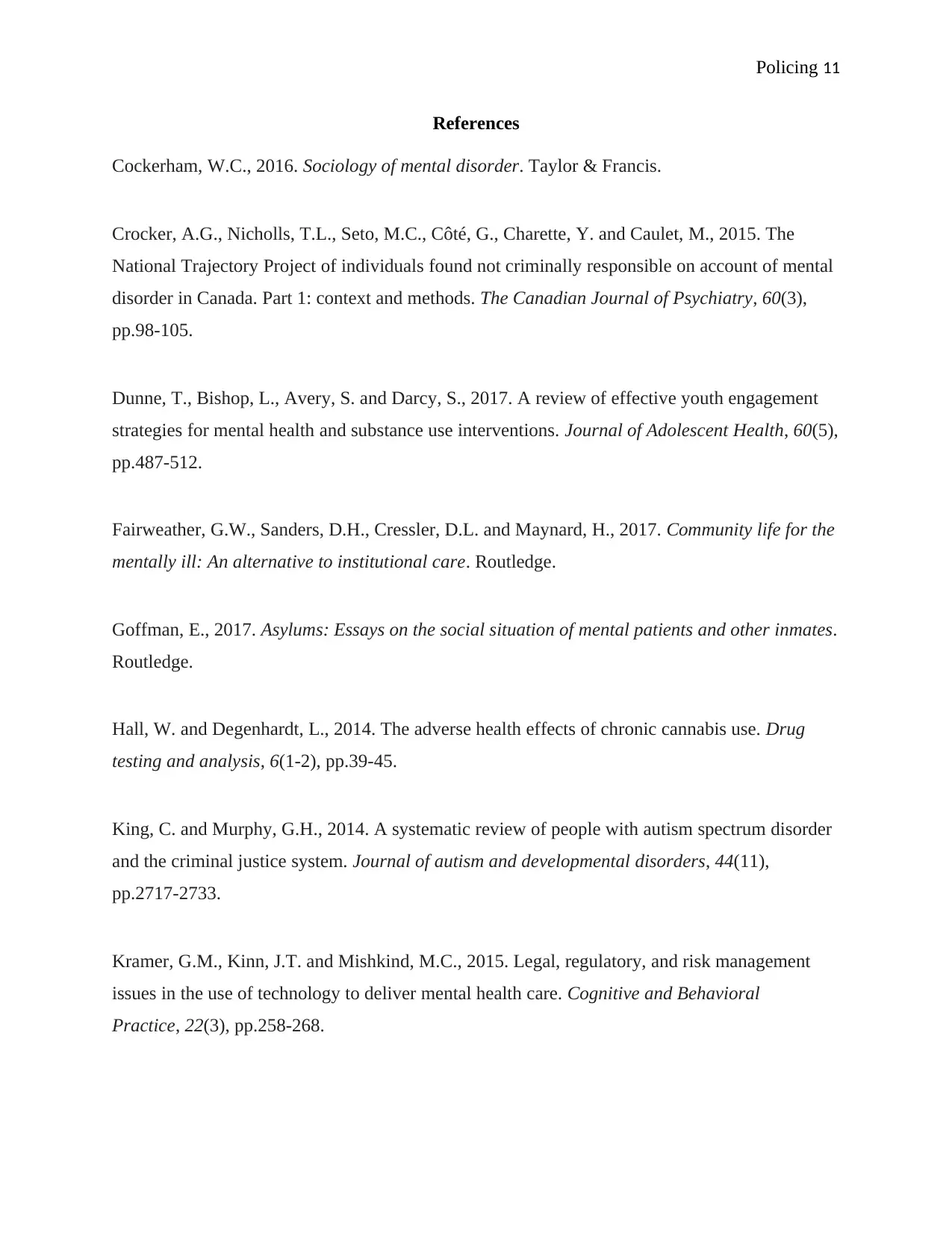
Policing 11
References
Cockerham, W.C., 2016. Sociology of mental disorder. Taylor & Francis.
Crocker, A.G., Nicholls, T.L., Seto, M.C., Côté, G., Charette, Y. and Caulet, M., 2015. The
National Trajectory Project of individuals found not criminally responsible on account of mental
disorder in Canada. Part 1: context and methods. The Canadian Journal of Psychiatry, 60(3),
pp.98-105.
Dunne, T., Bishop, L., Avery, S. and Darcy, S., 2017. A review of effective youth engagement
strategies for mental health and substance use interventions. Journal of Adolescent Health, 60(5),
pp.487-512.
Fairweather, G.W., Sanders, D.H., Cressler, D.L. and Maynard, H., 2017. Community life for the
mentally ill: An alternative to institutional care. Routledge.
Goffman, E., 2017. Asylums: Essays on the social situation of mental patients and other inmates.
Routledge.
Hall, W. and Degenhardt, L., 2014. The adverse health effects of chronic cannabis use. Drug
testing and analysis, 6(1-2), pp.39-45.
King, C. and Murphy, G.H., 2014. A systematic review of people with autism spectrum disorder
and the criminal justice system. Journal of autism and developmental disorders, 44(11),
pp.2717-2733.
Kramer, G.M., Kinn, J.T. and Mishkind, M.C., 2015. Legal, regulatory, and risk management
issues in the use of technology to deliver mental health care. Cognitive and Behavioral
Practice, 22(3), pp.258-268.
References
Cockerham, W.C., 2016. Sociology of mental disorder. Taylor & Francis.
Crocker, A.G., Nicholls, T.L., Seto, M.C., Côté, G., Charette, Y. and Caulet, M., 2015. The
National Trajectory Project of individuals found not criminally responsible on account of mental
disorder in Canada. Part 1: context and methods. The Canadian Journal of Psychiatry, 60(3),
pp.98-105.
Dunne, T., Bishop, L., Avery, S. and Darcy, S., 2017. A review of effective youth engagement
strategies for mental health and substance use interventions. Journal of Adolescent Health, 60(5),
pp.487-512.
Fairweather, G.W., Sanders, D.H., Cressler, D.L. and Maynard, H., 2017. Community life for the
mentally ill: An alternative to institutional care. Routledge.
Goffman, E., 2017. Asylums: Essays on the social situation of mental patients and other inmates.
Routledge.
Hall, W. and Degenhardt, L., 2014. The adverse health effects of chronic cannabis use. Drug
testing and analysis, 6(1-2), pp.39-45.
King, C. and Murphy, G.H., 2014. A systematic review of people with autism spectrum disorder
and the criminal justice system. Journal of autism and developmental disorders, 44(11),
pp.2717-2733.
Kramer, G.M., Kinn, J.T. and Mishkind, M.C., 2015. Legal, regulatory, and risk management
issues in the use of technology to deliver mental health care. Cognitive and Behavioral
Practice, 22(3), pp.258-268.
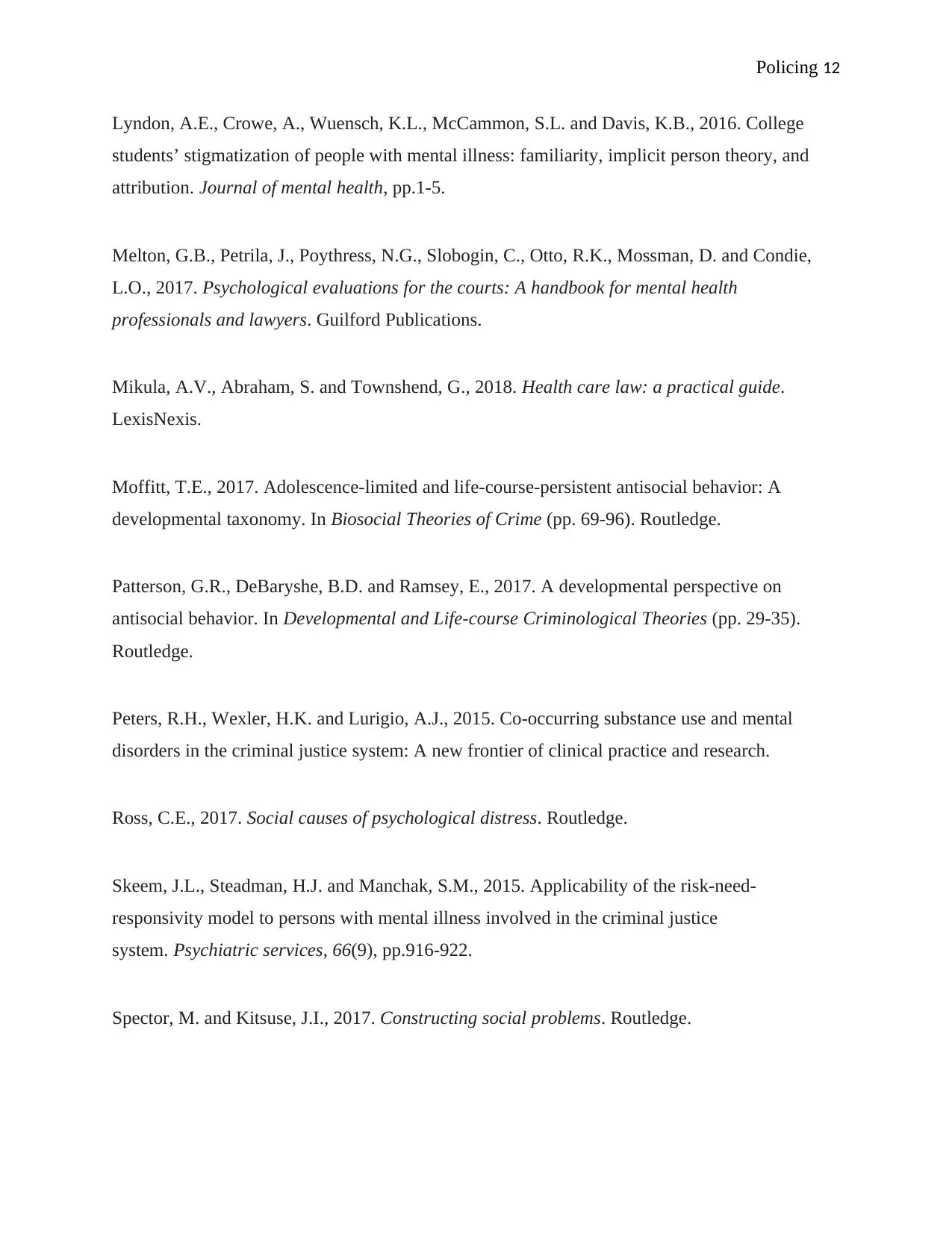
Policing 12
Lyndon, A.E., Crowe, A., Wuensch, K.L., McCammon, S.L. and Davis, K.B., 2016. College
students’ stigmatization of people with mental illness: familiarity, implicit person theory, and
attribution. Journal of mental health, pp.1-5.
Melton, G.B., Petrila, J., Poythress, N.G., Slobogin, C., Otto, R.K., Mossman, D. and Condie,
L.O., 2017. Psychological evaluations for the courts: A handbook for mental health
professionals and lawyers. Guilford Publications.
Mikula, A.V., Abraham, S. and Townshend, G., 2018. Health care law: a practical guide.
LexisNexis.
Moffitt, T.E., 2017. Adolescence-limited and life-course-persistent antisocial behavior: A
developmental taxonomy. In Biosocial Theories of Crime (pp. 69-96). Routledge.
Patterson, G.R., DeBaryshe, B.D. and Ramsey, E., 2017. A developmental perspective on
antisocial behavior. In Developmental and Life-course Criminological Theories (pp. 29-35).
Routledge.
Peters, R.H., Wexler, H.K. and Lurigio, A.J., 2015. Co-occurring substance use and mental
disorders in the criminal justice system: A new frontier of clinical practice and research.
Ross, C.E., 2017. Social causes of psychological distress. Routledge.
Skeem, J.L., Steadman, H.J. and Manchak, S.M., 2015. Applicability of the risk-need-
responsivity model to persons with mental illness involved in the criminal justice
system. Psychiatric services, 66(9), pp.916-922.
Spector, M. and Kitsuse, J.I., 2017. Constructing social problems. Routledge.
Lyndon, A.E., Crowe, A., Wuensch, K.L., McCammon, S.L. and Davis, K.B., 2016. College
students’ stigmatization of people with mental illness: familiarity, implicit person theory, and
attribution. Journal of mental health, pp.1-5.
Melton, G.B., Petrila, J., Poythress, N.G., Slobogin, C., Otto, R.K., Mossman, D. and Condie,
L.O., 2017. Psychological evaluations for the courts: A handbook for mental health
professionals and lawyers. Guilford Publications.
Mikula, A.V., Abraham, S. and Townshend, G., 2018. Health care law: a practical guide.
LexisNexis.
Moffitt, T.E., 2017. Adolescence-limited and life-course-persistent antisocial behavior: A
developmental taxonomy. In Biosocial Theories of Crime (pp. 69-96). Routledge.
Patterson, G.R., DeBaryshe, B.D. and Ramsey, E., 2017. A developmental perspective on
antisocial behavior. In Developmental and Life-course Criminological Theories (pp. 29-35).
Routledge.
Peters, R.H., Wexler, H.K. and Lurigio, A.J., 2015. Co-occurring substance use and mental
disorders in the criminal justice system: A new frontier of clinical practice and research.
Ross, C.E., 2017. Social causes of psychological distress. Routledge.
Skeem, J.L., Steadman, H.J. and Manchak, S.M., 2015. Applicability of the risk-need-
responsivity model to persons with mental illness involved in the criminal justice
system. Psychiatric services, 66(9), pp.916-922.
Spector, M. and Kitsuse, J.I., 2017. Constructing social problems. Routledge.
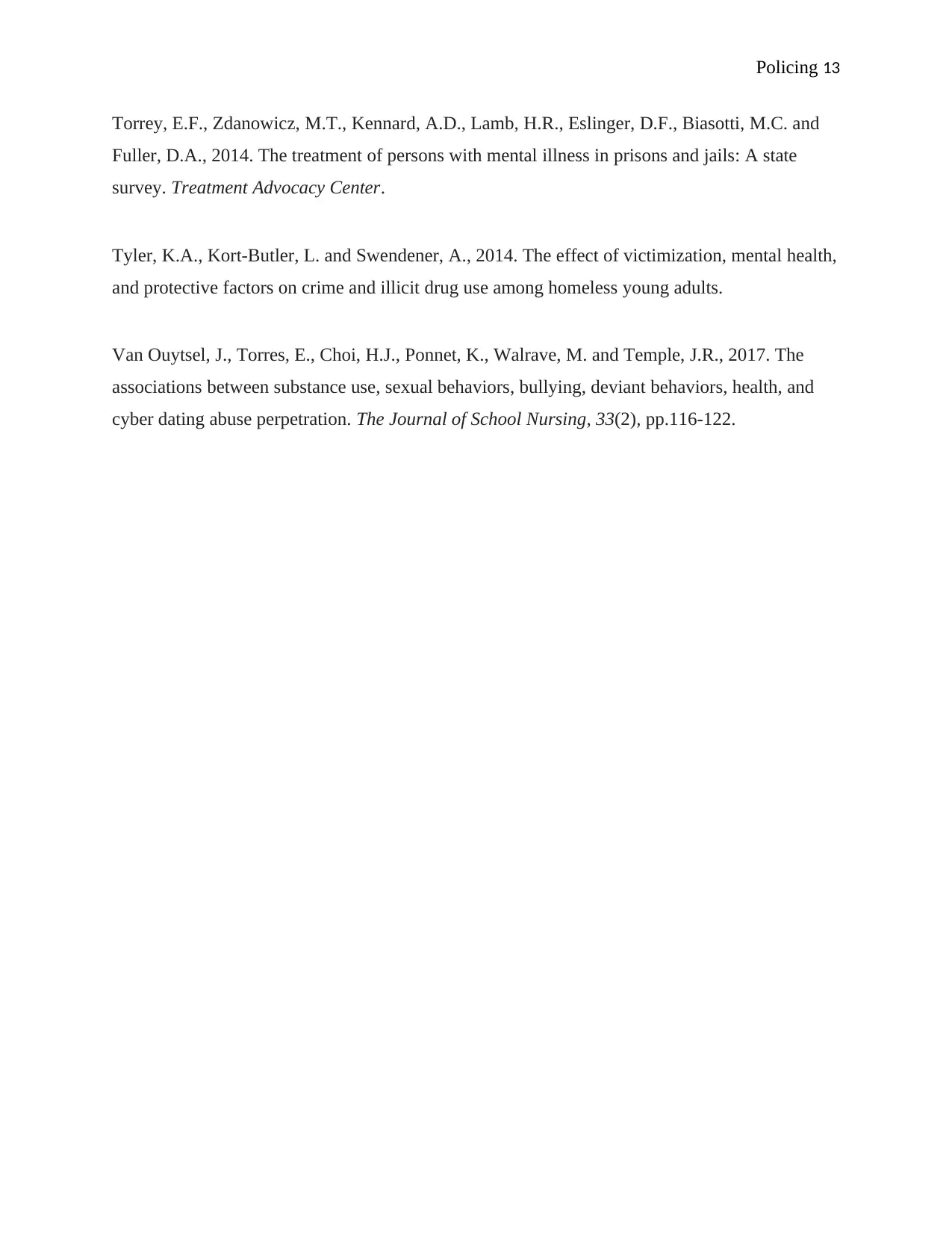
Policing 13
Torrey, E.F., Zdanowicz, M.T., Kennard, A.D., Lamb, H.R., Eslinger, D.F., Biasotti, M.C. and
Fuller, D.A., 2014. The treatment of persons with mental illness in prisons and jails: A state
survey. Treatment Advocacy Center.
Tyler, K.A., Kort-Butler, L. and Swendener, A., 2014. The effect of victimization, mental health,
and protective factors on crime and illicit drug use among homeless young adults.
Van Ouytsel, J., Torres, E., Choi, H.J., Ponnet, K., Walrave, M. and Temple, J.R., 2017. The
associations between substance use, sexual behaviors, bullying, deviant behaviors, health, and
cyber dating abuse perpetration. The Journal of School Nursing, 33(2), pp.116-122.
Torrey, E.F., Zdanowicz, M.T., Kennard, A.D., Lamb, H.R., Eslinger, D.F., Biasotti, M.C. and
Fuller, D.A., 2014. The treatment of persons with mental illness in prisons and jails: A state
survey. Treatment Advocacy Center.
Tyler, K.A., Kort-Butler, L. and Swendener, A., 2014. The effect of victimization, mental health,
and protective factors on crime and illicit drug use among homeless young adults.
Van Ouytsel, J., Torres, E., Choi, H.J., Ponnet, K., Walrave, M. and Temple, J.R., 2017. The
associations between substance use, sexual behaviors, bullying, deviant behaviors, health, and
cyber dating abuse perpetration. The Journal of School Nursing, 33(2), pp.116-122.
1 out of 13
Related Documents
Your All-in-One AI-Powered Toolkit for Academic Success.
+13062052269
info@desklib.com
Available 24*7 on WhatsApp / Email
![[object Object]](/_next/static/media/star-bottom.7253800d.svg)
Unlock your academic potential
© 2024 | Zucol Services PVT LTD | All rights reserved.





